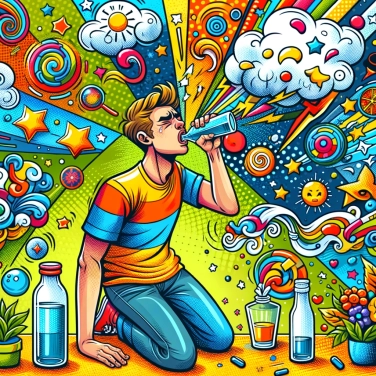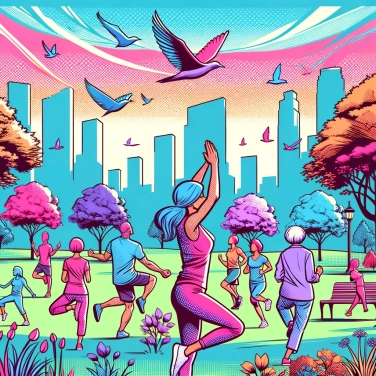Hiccups are caused by spasms of the diaphragm. To get rid of them, you can try holding your breath for a few seconds or drinking water in small sips.

Hiccups are the result of an involuntary spasm of the diaphragm, the main muscle that allows for quiet breathing. When it suddenly contracts without warning, it quickly pushes air towards the vocal cords, creating that famous "hic" sound that we all know. Many things can trigger these uncontrolled contractions: eating or drinking too quickly, swallowing air without realizing it, drinking carbonated beverages a bit too fast, overindulging in alcohol, or even experiencing strong emotions like nervousness or stress. Sometimes, a sudden change in temperature in your stomach (like having something hot right after something cold, for example) is enough to trigger this unpleasant reflex.
Hiccups are actually an involuntary contraction of the diaphragm, the muscle located beneath the lungs, which plays an essential role when we breathe. Normally, this muscle gently descends to allow air in and rises calmly when we exhale. However, sometimes, for various small reasons like eating too quickly, swallowing air, or drinking a carbonated beverage, the diaphragm suddenly starts to contract. As a result, air is suddenly drawn into the lungs, causing a sudden closure of the glottis, the small opening between the vocal cords. That's when the famous "hic" occurs: it's the characteristic sound of hiccups! Generally, these contractions do not last long and are completely benign, but they can sometimes be bothersome or annoying.
Try to hold your breath for a few seconds; this temporarily relaxes your diaphragm, which is acting up. Quickly swallowing a large glass of cold water can also soothe this nerve irritation. Slowly swallowing a spoonful of powdered sugar also helps stop the spasms. Another simple trick is to gently pull your tongue outward for a few seconds, as it stimulates certain nerves and interrupts the nerve reflex causing hiccups. Finally, you can also lean forward while holding your breath to apply pressure on your abdomen, which usually calms the situation quickly.
To avoid recurrences of hiccups, especially avoid overly heavy meals or eating too quickly. Eat slowly, making sure to chew each bite well. Limit your consumption of carbonated drinks, as they can promote the onset of hiccups by inflating your stomach. Be cautious of sudden temperature changes inside your mouth: drinking very cold or very hot liquids too quickly can trigger an episode. A simple tip: breathe regularly, take the time to swallow slowly, and reduce your alcohol intake, which can irritate your diaphragm. If you get stressed easily, some relaxing techniques or breathing exercises can also help.
Animals such as cats, dogs, and even some reptiles can also get hiccups. This is particularly common in puppies and kittens due to their still-immature nervous systems.
Even though holding your breath to stop hiccups is a very popular method, no serious study has actually proven its effectiveness, but it remains safe to try on your own.
Some strong spices, such as chili, can trigger hiccups because they stimulate the nerves connected to the diaphragm, causing involuntary contractions.
Babies often experience hiccups from birth, sometimes even while their mom is still pregnant, because their diaphragm is undergoing growth and muscle maturation.
By holding one’s breath, the concentration of carbon dioxide in the lungs temporarily increases, which can help relax the diaphragm that is experiencing involuntary contractions. This is why this technique is often effective for quickly stopping hiccups.
Yes, stress and anxiety, by increasing the respiratory rate and causing involuntary muscle contractions, can trigger or worsen episodes of hiccups. Learning to manage stress through breathing techniques, relaxation, or meditation can therefore help reduce these episodes.
Some foods can promote hiccups, including carbonated, spicy, or alcoholic beverages. Meals that are very hot, too cold, or consumed too quickly can also trigger hiccups. It is advisable to eat slowly, chew well, and avoid excessive consumption of irritating foods.
Sure! Here’s the translation: "Yes, hiccups are common in infants due to their diaphragm still maturing. Generally, there is no reason to worry, and hiccups go away on their own. You can simply try to calm your baby and wait patiently. However, if the phenomenon occurs very frequently or is bothersome, seeking medical advice may be helpful."
In most cases, hiccups are benign and resolve quickly on their own. However, if they last more than 48 hours or occur very frequently, it is advisable to consult a doctor, as they could be symptomatic of a more serious medical issue.

0% of respondents passed this quiz completely!
Question 1/5